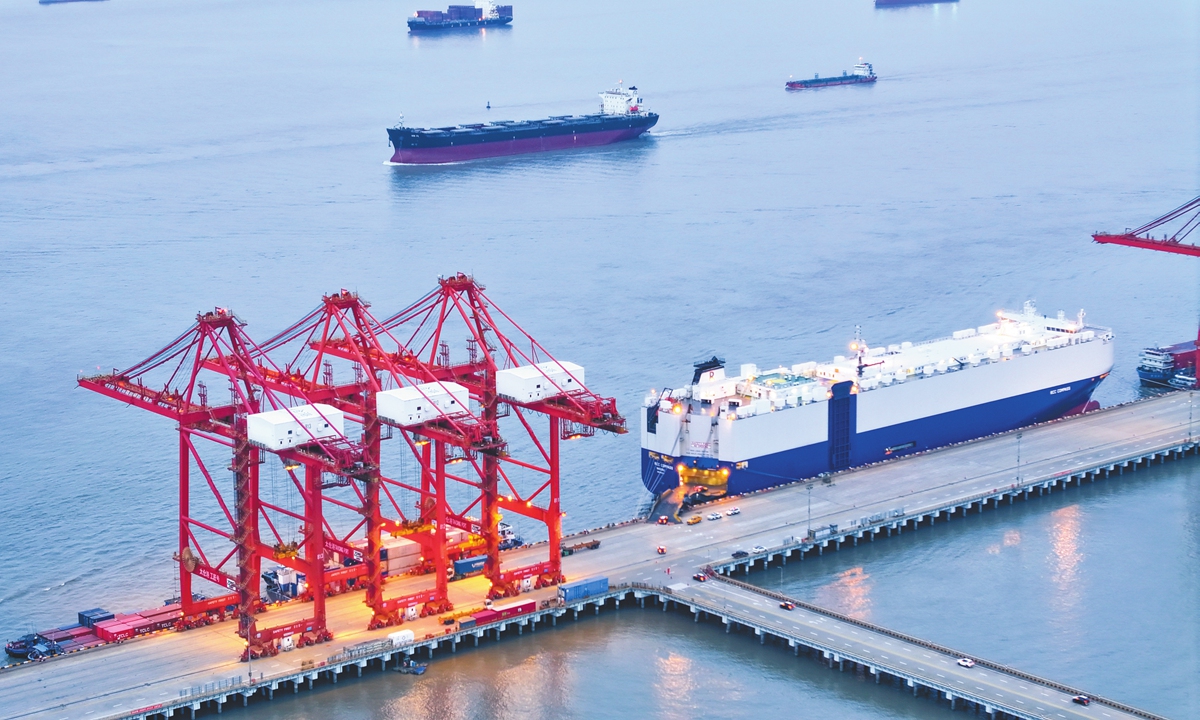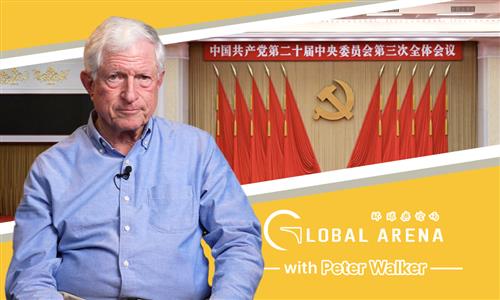
A ro-ro ship carrying electric vehicles docks at Taicang Port in Suzhou, East China's Jiangsu Province, on July 9, 2024. Photo: VCG
Editor's Note:
As the Chinese economy, along with the entire global economy, faces considerable challenges in recent years, some Western officials and media outlets have stepped up their long-standing smear campaign against the world's second-largest economy. They cherry-pick information and even distort facts to hype various specious narratives such as "Peak China," while turning a blind eye to China's considerable strengths and vast potential.
As part of the Global Times' multimedia project to set the record straight, the opinion page is publishing a series of in-depth interviews and signed articles with economists, experts and scholars from different countries who share their views on the prospects of the Chinese economy and debunk Western rhetoric.
In the tenth article of the series, Global Times (GT) reporter Wang Zixuan talked to Brazilian economist and former vice-president of the New Development Bank Paulo Nogueira Batista Jr (Nogueira). Nogueira noted that when it comes to the Chinese economy, envy and rivalry play a large role in Western negative rhetoric.
GT: What do you think of China's current economic situation? How do you perceive China's pursuit of high-quality development and its accomplishments in this regard?
Nogueira: Despite repeated forecasts of doom in the Western media, academic circles and international financial institutions controlled by the US and Europe, China has consistently shown its resilience as a dynamic economy - and notwithstanding increasing economic sanctions applied by the US and its satellites. China can be expected to continue with its high-quality economic and social development. I would even say that China is, in many respects, a role model for other nations in the Global South. I lived in Shanghai for two and a half years as vice president of the New Development Bank established by the BRICS, and was truly impressed by the quality of the city's infrastructure.
GT: You once said that the US dollar has become "weaponized" and is no longer trustworthy. BRICS countries, therefore, need currencies that can replace the US dollar. Why is the US dollar no longer trustworthy? What important role have the BRICS countries played in the global economy?
Nogueira: The US dollar has one main enemy - the US government itself! When sanctions based on the role of the dollar and the Western financial system are applied to a number of countries across the globe such as Venezuela, Iran, Afghanistan, Syria, Libya and especially Russia, governments cannot be expected to trust the dollar. China, for example, has the second-largest international reserves in US Treasuries. It can only be expected that the Chinese government will strive to reduce, gradually and cautiously, its exposure to the dollar and to US financial sanctions, especially with tensions with the US over the island of Taiwan and the South China Sea.
In this context, I believe the BRICS, one of the driving forces of the world economy, should strive to build alternatives to the dollar. This work is already ongoing under the Russian presidency of the BRICS in 2024 and I hope that Brazil will continue these efforts under its presidency in 2025. As the second largest economy, China's stance toward this matter will be decisive. The goal should be, in my view, to establish a new reference currency in the BRICS, not to replace existing national currencies like the euro did, but a means of providing a safe mechanism for international transactions and international reserve holdings.
GT: Why is the West constantly hyping negative rhetoric regarding the Chinese economy, such as the "China collapse" theory or "overcapacity"?
Nogueira: Envy and rivalry play a large role here. Quite simply, the US cannot tolerate the fact that it is no longer the largest economy on the planet, in PPP (purchasing power parity) terms. Unfortunately, the need to be No.1 is ingrained in the US mentality. The negative rhetoric is an attempt to undermine the Chinese economy and generate an atmosphere that could be conducive to harming its further development. This attempt is fruitless. It is a big waste of time and neglects the fact that Western economies could benefit from win-win cooperation, as the Chinese always say.
GT: Some Western media outlets hype that China's "unfair" trade policies and the China-US trade disputes are increasingly raising concerns among countries in South America. How do you respond to this view?
Nogueira: China's international competitiveness has been rising intensely in recent decades. This raises concerns in the US, Europe and also in some countries in South America. The large-scale imports from China threaten entire industrial sectors in several parts of the world, resulting in many countries reverting back to protectionism and import restrictions on Chinese goods. Ironically, this has been happening on a large scale in Western high-income countries - precisely those that were champions of free trade when they had an edge in terms of technology and international competitiveness. Now, they want to change the rules of the game. If there is indeed evidence of subsidies and unfair trade practices on the part of China, this would be grounds for the imposition of compensating restrictions. However, is the evidence always presented to back up the accusations made against China?
GT: During a period of global economic turmoil, how do you think China's high-quality development model contributes to the stability of the world economy?
Nogueira: The whole world, without exception, needs the dynamic impulse provided by China's economy, especially if this leads to the diversified development of other countries, including reindustrialization and technological development. Economic growth is the best guarantee of fruitful stability. Stability must come with growth, and China's remarkable development clearly shows this.
GT: This year marks the 50th anniversary of the establishment of diplomatic relations between China and Brazil. What do you think is the most impressive achievement over the five decades?
Nogueira: Establishing diplomatic relations with China was a decision taken under the Geisel administration in Brazil, which was one of the most independent governments we have had in recent decades. Brazil has become the eighth largest economy in the world; it has the fifth largest territory and the seventh largest population. China is the second largest economy; it has the third largest territory and the second largest population. It is only natural that the establishment of diplomatic relations between these two powers should lead to remarkable achievements. In 1974, China had yet to begin its impressive long-term and sustained economic rise. Since then, China has become Brazil's main trading partner and one of the main foreign investors in my country. The two nations have come closer together, including in the BRICS, but also through people-to-people contacts, cultural interchanges and political ties.
GT: Brazilian President Luiz Inacio Lula da Silva recently revealed a plan for Brazil to join the Belt and Road Initiative (BRI). President Lula also said in July that China is "crucial to Brazil's economic growth" and that he hopes to establish an "infinitely close" "new strategic partnership" with China. How can Brazil benefit from joining the BRI or deepening its partnership with China?
Nogueira: Brazil and China are interested in Brazil formally joining the BRI. The question is on what terms will Brazil participate. It is important that the two countries agree on a mutually attractive partnership. That is what President Lula probably means when he speaks of a new partnership. Our trade relations should not continue in the current pattern in which Brazil exports commodities to China and imports industrial products. Brazil would like to benefit from Chinese investments in the manufacturing sector with technology transfer. In general, the key to success would be investments coming in the form of building new capacity, and not simply acquisitions of existing enterprises.

